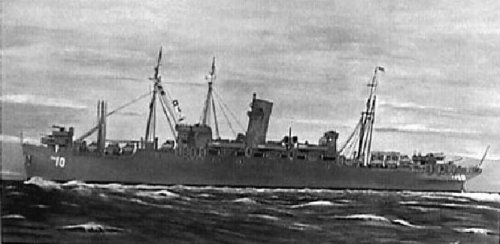

John Penn 1942
| No | Name | Yard No | Builder | Laid down | Launched | Comm | Fate |
| AP17, 2.1943- APA10 | Harry Lee (ex-Exochorda) | 395 | New York SB, Camden // Todd, Hoboken | 11.1929 | 18.10.1930 | 1.1931 // 12.1940 | to Turkey 4.1948 |
| AP50 | Joseph Hewes (ex-Excalibur) | 394 | New York SB, Camden // | 11.1929 | 5.8.1930 | 12.1930 // 5.1942 | sunk 11.11.1942 |
| AP51, 2.1943- APA23 | John Penn (ex-Excambion) | 397 | New York SB, Camden // | 10.1930 | 28.5.1931 | 8.1931 // 4.1942 | sunk 13.8.1943 |
| AP52 | Edward Rutledge (ex-Exeter) | 396 | New York SB, Camden // | 8.1930 | 4.4.1931 | 6.1931 // 4.1942 | sunk 7.12.1942 |
|
Displacement standard, t |
9989 |
|
Displacement full, t |
14520 |
|
Length, m |
144.9 |
|
Breadth, m |
18.8 |
|
Draught, m |
7.70 |
|
No of shafts |
1 |
|
Machinery |
1 set Parsons geared steam turbines, 4 Babcock & Wilcox boilers |
|
Power, h. p. |
7200 |
|
Max speed, kts |
16 |
|
Fuel, t |
oil 1462 |
| Endurance, nm(kts) | 12500(12) |
|
Armament |
4 x 1 - 76/50 Mk 10.17, 4 x 1 - 12.7/90 |
| Military load |
22 LCVP, 2 - 4 LCM(3), cargo, troops by 1945: 2 LCM(3), 13 LCVP, 1 LCPL, 1 LCPR, 1200t of cargo, 1118 marines |
|
Complement |
453 |
Project history: USN military transport vessels were sectioned into two groups: ÀÐ for transportation of troops and ÀÊ for carriage of goods and technics. The majority of them were built on the basis of standard types Ñ2, Ñ3 and Ñ4 and differed from usual cargo ships a little.
For delivery of troops and cargoes directly to a beaching place assault landing transport ships (ÀÐÀ and ÀÊÀ) served, which main difference from ÀÊ and ÀÐ consisted that they were extra equipped with disembarkation craft of LCVP, LCM and LCP (L) types; with their help delivery of people and cargoes to beach also was effected.
Originally similar ships were not outlined in own subclass and were registered as ÀÐ and ÀÊ. In February, 1943 reorganisation was done and assault transports have received indexation ÀÐÀ and ÀÊÀ.
Two ships of Doyen class, projected even on the eve of war for landing operations in Caribbean basin, became the first American assault military transports. The overwhelming majority of remaining ÀÐÀ and ÀÊÀ has been converted from merchant cargo and cargo-passenger vessels or constructed in hulls of standard cargo vessels built by the big series in days of war. An exception were specially projected as assault transports Gilliam (ÀÐÀ) and Artemis (ÀÊÀ) classes.
Besides the large landing transport ships of ÀÐÀ and ÀÊÀ classes, small landing parties and subversive groups were landed by fast landing transports (APD) converted from become outdated Wickes and Clemson classes destroyers and destroyer escorts of Buckley and Rudderow classes.
Harry Lee class ships were ex-cargo-passenger vessels of American Export Lines.
Modernizations: by 1945 survived ships were armed with
4 x 1 - 76/50 Mk 10.17, 2 x 2 - 40/56 Mk 1.2, 16 x 1 - 20/70 Mk 4, SC or SF or SL or SN or SO or SU radar1/1946: 4 x 1 - 76/50 Mk 20/21, 2 x 2 - 40/60 Mk 1, 16 x 1 - 20/70 Mk 10, SC or SF or SL or SN or SO or SU radar
Naval service: Joseph Hewes (planned APA22) was sunk by German submarine U173 11.11.1942 off Morocco coast, Edward Rutledge (planned APA24) was torpedoed by German submarine U130 12.11.1942 at the same area. John Penn was sunk by Japanese torpedo bombers off Lunga Point (Guadalcanal) 13.8.1943.

Harry Lee
© Ivan Gogin, 2014-15